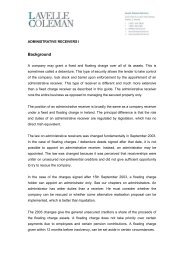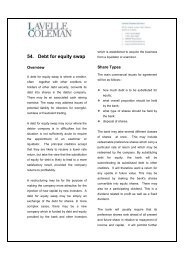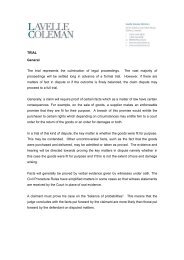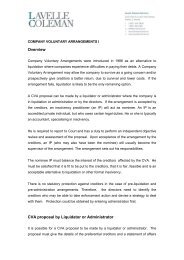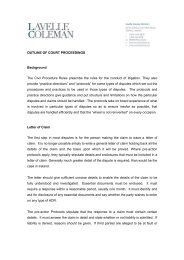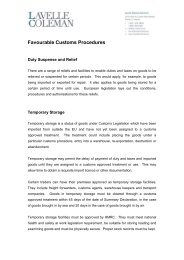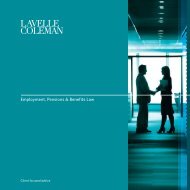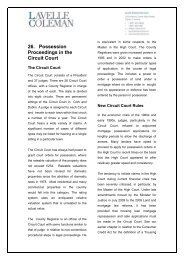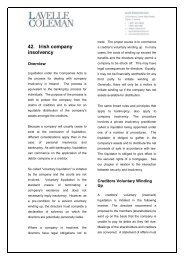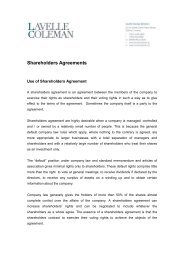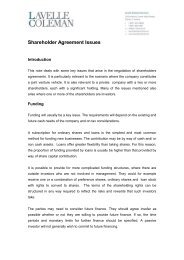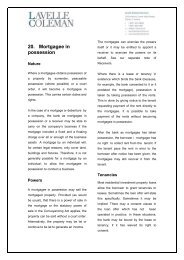45. Negligence and Breach of Duty Claims - Lavelle Coleman
45. Negligence and Breach of Duty Claims - Lavelle Coleman
45. Negligence and Breach of Duty Claims - Lavelle Coleman
You also want an ePaper? Increase the reach of your titles
YUMPU automatically turns print PDFs into web optimized ePapers that Google loves.
services. A solicitor may only act for both the<br />
bank <strong>and</strong> borrower if there is no potential<br />
conflict <strong>of</strong> interest or if the conflict is fully<br />
disclosed <strong>and</strong> both consent to the solicitor<br />
acting. Under the st<strong>and</strong>ard Law Society<br />
Certificate <strong>of</strong> title, the bank is not the<br />
solicitors client.<br />
Basis <strong>of</strong> Liability<br />
The cases illustrate the courts approach to<br />
cases where the lender alleges it would not<br />
have lent or would have lent less, but for<br />
valuers negligence or the failure <strong>of</strong> a<br />
solicitor to disclose some material defect or<br />
matter. The cases indicate that there were<br />
three scenarios:<br />
v the lender would not have lent if it had<br />
been known the true position. In this<br />
case, the valuer <strong>and</strong>/or solicitor is<br />
potentially liable for the entire loss<br />
subject to issues <strong>of</strong> contributory<br />
negligence <strong>and</strong> the lenders obligation to<br />
mitigate.<br />
v the lender would have been unwilling to<br />
lend the same amount, if it had known<br />
the true position. In this case, the valuer<br />
<strong>and</strong>/or solicitor may be liable for a<br />
maximum <strong>of</strong> the difference between the<br />
amount lent <strong>and</strong> the amount if would<br />
have lent, had it known the true position.<br />
v The lender would have entered the<br />
transaction anyway had it known the<br />
true position. In this, there is no liability<br />
because they have caused no loss.<br />
The retainer agreement/contract will define<br />
the liability in relation to the services<br />
concerned. Liability may be limited by the<br />
term <strong>of</strong> the agreement. In the case <strong>of</strong> some<br />
advisors, the relevant pr<strong>of</strong>essional rules may<br />
restrict the extent to which liability may be<br />
limited. An advisor may be liable to a client<br />
both for breach <strong>of</strong> contract <strong>and</strong> for<br />
negligence. If the contract validly limits the<br />
level <strong>of</strong> liability, this cannot be circumvented<br />
by claiming for negligence.<br />
A lender may be guilty <strong>of</strong> contributory<br />
negligence by failure to make its own<br />
enquiries <strong>and</strong> ignoring obvious risks <strong>of</strong><br />
which it was aware. The lender may be<br />
familiar with the market <strong>and</strong> may be aware<br />
<strong>of</strong> partcular practices. If it is equally aware or<br />
should have been aware <strong>of</strong> the risks, a court<br />
may decide that the solicitors or valuers<br />
negligence did cause the loss.<br />
Alternatively, the court may decide that the<br />
lender is partly responsible or guilty <strong>of</strong><br />
contributory negligent <strong>and</strong> that accordingly,<br />
its entitlement to compensation should be<br />
reduced.<br />
Regulation <strong>of</strong> Solicitors<br />
Solicitors are regulated by the Incorporated



